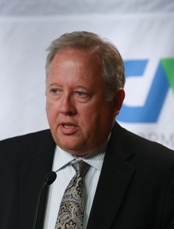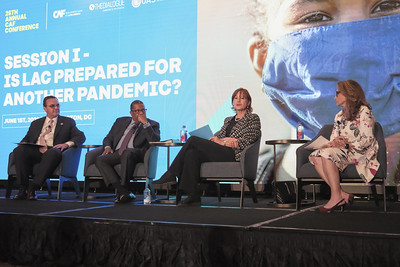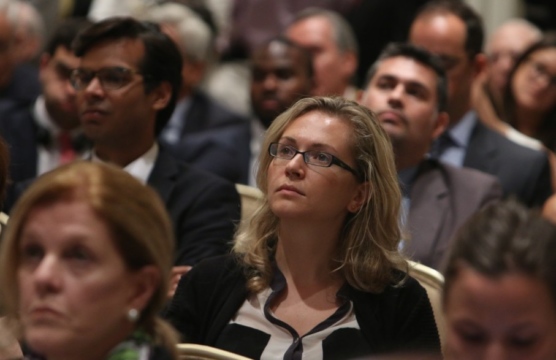
An Americas Agenda for the World
The Inter-American Democratic Charter is a watershed in how the region understands democracy.
At the 26th Annual CAF Conference, jointly organized by the Inter-American Dialogue, CAF-Development Bank of Latin America and the Caribbean, and the Organization of American States from June 1-2, 2023, expert panelists explored the question of Latin America and the Caribbean’s preparedness in the face of a future pandemic. The organizations convened Brian Nichols, US assistant secretary of state for Western Hemisphere affairs Beatriz Londoño, Former Minister of Health and Social Protection of Colombia, and Felicia Knaul, director of the Institute for Advanced Study of the Americas at the University of Miami to discuss this critical issue in a discussion moderated by Pablo Bartol, Manager for Social and Human Development of CAF – Development Bank of Latin America and former minister of social sevelopment of Uruguay. Despite making up less than 10 percent of the world’s population, the region accounted for more than 25 percent of worldwide deaths from the Covid-19 pandemic. The panel focused on the ways in which healthcare policy in LAC shifted during and after the pandemic, as well as the outcomes from pandemic policy implementations.
Bartol opened the session by asking panelists whether the pandemic’s impacts and its exposure of existing inequalities within Latin American and Caribbean countries’ healthcare systems have increased awareness around the need to prioritize health spending. Nichols agreed that the pandemic highlighted existing inequalities in access to healthcare, exacerbating the urban-rural divide, and showed us the importance of closing these gaps. He also said that the question as to whether the region is prepared for another pandemic depends largely on the type of pandemic, adding that if it is an airborne disease that spreads quickly, our capacity to swiftly react remains limited. Likewise, if the pandemic originates in a faraway place like Asia again, there will be more time for the Western Hemisphere to prepare. Londoño responded that when talking about preparedness, it is also important to think beyond the healthcare sector – we must, she said, push for intra-government preparedness and coordination with the private sector, civil society, subnational governments, and multilateral organizations. This includes a transformation in the way in which we use data in health to help make us make informed, science-based decisions, as well as tackling disinformation. Finally, Londoño said that coordination must be proactively, technically, and intentionally built, not ideologized nor spurred by the next emergency, for the region’s healthcare systems to become more resilient. Knaul pointed out that LAC has been testing ground for some of the most innovative healthcare reforms worldwide. The pandemic showed not just how significant healthcare is an economic sector, but also the weaknesses of LAC’s health systems, including the lack of sufficient financing. Healthcare systems and social protection should reduce inequality and poverty, Knaul said, but they are caught in a vicious cycle in which inadequate investment fuels unequal access to health, and now we have the opportunity to revert this.
Bartol then turned to Nichols with a question on what Latin American and Caribbean countries can do to ensure access to vaccines and personal protective equipment (PPE) in the case of a future pandemic. Nichols said countries have been developing the technological capacity to produce masks and other types of medical equipment and that pharmaceutical companies have heavily invested in countries across the region, including Mexico, Chile, Brazil, and Costa Rica, all of which could potentially produce vaccines. The region should create networks to collaborate and share knowledge, Nichols added, emphasizing that such cooperation should take place before the emergency materializes. For example, US Secretary of State Blinken has created a network for foreign ministers to collaborate on the political level, and there are also regional networks in place for health ministries. All of this must go hand in hand with financing from international organizations, in addition to improving communication strategies to avoid misinformation.
In response to a question on international cooperation during the Covid-19 pandemic, Londoño said it generally failed – even within regional blocs, vaccine nationalism and unequal vaccine access between developed and developing countries was evident. Cooperation must be built on trust and based on clear communication, and she highlighted the example set by CARICOM during the pandemic. CARICOM as a bloc developed not only a political but also a technical and practical response to the health emergency, establishing protocols, common practices, and clear rules. Londoño emphasized such coordination goes beyond the health sector and should imply better collaboration on trade, agriculture, sustainable development, and climate change.
Knaul then expanded on the need to view the pandemic as a “syndemic” – the notion of layered pandemics – to better understand the lessons from Covid-19 and mobilize them into preparedness for the next emergency. “The pandemic, the disease Covid-19, seeped into every crack that we saw in every system in every country,” Knaul said. “So pandemic preparedness is actually about having strong anti-poverty programs, about having feminist policy, about having an effective response to noncommunicable diseases, about working on eradicating poverty, because that is where we saw the multiple layers of the pandemic.” Additionally, a lack of cohesive national policymaking in most countries in the region was evident during the pandemic and contributed to the environment of punt politics that characterized governments’ responses, especially in Mexico and Brazil, she added. Knaul also emphasized the importance of gender diversity in unlocking innovation and growth in Latin American nations and the health sector in particular.
The panel concluded with each expert outlining their advice for multinational institutions such as CAF on the role they must play in pandemic preparedness. Nichols called attention to the importance of building political will across the hemisphere to address the weaknesses discussed during the session, including access to education, greater gender equality in the healthcare sector, and more transparent finances, and to keep them as a priority even after the sense of emergency subsides. Another crucial component is to have a long-term vision on what the economic implications of black swan events such as pandemics may have for the region, especially in the context of climate change and greater migratory patterns. Finally, Nichols pointed to the need for proper financing in key areas such as rural healthcare, digital inclusion, and education, and highlighted the role of multilaterals in providing technical expertise in this regard. Londoño added that there must be coordination between multilateral organizations themselves, leveraging shared goals and a common language to outline actions plans for countries in the region and evaluate their implementation. She also emphasized the need for multilateral-backed projects to transcend electoral terms in Latin American countries in order to ensure their continuity and circumvent political noise. Finally, Knaul sees a need for multilateral banks to carry out evaluations on pandemic policies for evidence-based lessons on what worked and what did not work, in addition to multilateral investment in cross-sector programs that also address poverty and inequality, particularly gender inequity. She ended by mentioning that an area of opportunity for multilateral banks is to work more closely with and even offer loans to subnational governments in the future.
The Inter-American Democratic Charter is a watershed in how the region understands democracy.
Summary of the XIV Annual CAF Conference
Regional integration, social inclusion, and the need for a more competitive business climate—discussed at the XVIII Annual CAF Conference
 Jack Schwartz
Jack Schwartz

 Video
Video